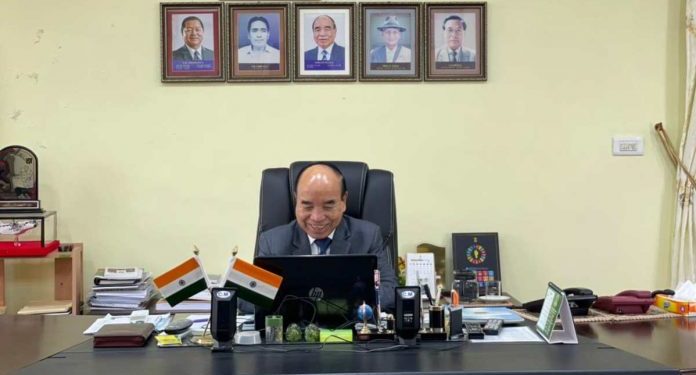The exodus of refugees from Myanmar (Burma) escaping crackdown by the military junta of that country to the bordering Indian state of Mizoram has created a diplomatic-humanitarian dilemma for India. The repression by the junta since it engineered a coup February 1 to deny power to the elected government led by Aung San Suu Kyi has assumed grave proportions. The order to shoot pro-democracy supporters of Burma has forced many police and security personnel to flee the country as they have refused to open fire on their own ‘brethren’. They are among about 300 refugees who have taken shelter in Mizoram. The junta has sent a missive to a Mizoram government official to deport the personnel who incurred its wrath by disobeying the shoot at sight order.
Mizoram Chief Minister Zoramthanga has been categorical in his support to the cause of the refugees who have close ethnic ties with the dominant section of the state’s population. The ruling Mizo National Front is an ally of the National Democratic Alliance and as such the CM has written to Prime Minister Narendra Modi explaining why the Centre’s order on 10 March to the four bordering states of Mizoram, Tripura, Manipur and Arunachal Pradesh, to stop the entry of the refugees is unacceptable to the state. The Mizoram government’s stand is that both the state and the Centre should extend all kinds of help to the refugees on humanitarian grounds till normalcy returns to Burma. These refugees are being hounded by the junta for protesting against the coup and demanding restoration of the democratic process in their country.
There has been a steady influx of refugees to Mizoram through the over 1,600 km-long porous borders between India and Burma. Realising the magnitude of the suffering of their tribe in the neighbouring country, Mizoram state government has followed a standard operating procedure (SOP) to give temporary shelter to the refugees. The MP from Mizoram told Parliament about the plight of about 300 refugees in Mizoram and urged the Centre to help as the state lacks the resources and wherewithal to provide shelter to them. However, the SOP was stopped after the Union Ministry of Home Affairs (MHA) wrote to the Assam Rifles and the four bordering states directing them to check illegal influx from that country. It cited earlier guidelines for the identification and deportation of illegal migrants. However, the Mizoram government has declined to abide by the instructions on the ground of ethnic ties between the Mizos and residents of the bordering Chin state of Burma. It insists that it can’t be indifferent to their sufferings. The stand of that state government must be admired in these difficult times.
In fact, most of the refugees are from Myanmar’s Chin state, which shares a 404-km border with Mizoram itself. The residents of Chin have close ethnic ties with the Mizo and Kuki tribes scattered across Mizoram and Manipur.
The Assam Rifles has, on Centre’s instruction, stepped up surveillance along the border identifying 58 crossing points as being vulnerable to infiltration over the past few weeks. But, the force is caught in a dilemma as it has to rely on the local Mizos for information as well as checking illegal activities along the border, including smuggling. It obviously can’t afford to antagonise the locals by being harsh with refugees having strong ethnic ties with them. In fact, the relationship has been officially recognised by both the countries in the form of a free movement regime (FMR) that allows people in border villages to trade and move freely up to 16 kilometres inside each other’s territory. But the FMR has been suspended since March 2020 on account of the Covid-19 pandemic.
The Centre has, however, iterated that state governments and Union Territory Administrations have no powers to grant ‘refugee’ status to any foreigner and India is not a signatory to the UN Refugee Convention of 1951 and its 1967 protocol. The Indian government’s dilemma stems from the fact that it has been getting assistance from the Myanmar junta for tackling insurgents operating in the north-east from its soil. India can’t adopt an ostrich-like policy when, as the Mizoram CM pointed out to the Centre, Myanmar is in turmoil and ‘innocent, hapless citizens are being persecuted and killed by the military regime’ on a daily basis. Every day, terrified Burmese citizens are struggling to cross over to Mizoram in search of shelter and protection.
Just as the state government has no power to accord refugee status to any foreigner, similarly, the Centre’s infrastructure to stop infiltration is woefully inadequate.
A humanitarian crisis is snowballing in the neighbouring country and the Centre should give precedence to humanitarian concerns rather than to diplomatic niceties. Bangladesh did so in the recent past giving shelter to hundreds of thousands of Rohingya refugees fleeing brutalities by Myanmar’s military. The Indian government shut its doors to the Rohingyas because of its skewed ethno-religious policy. The mistake should not be repeated.






































